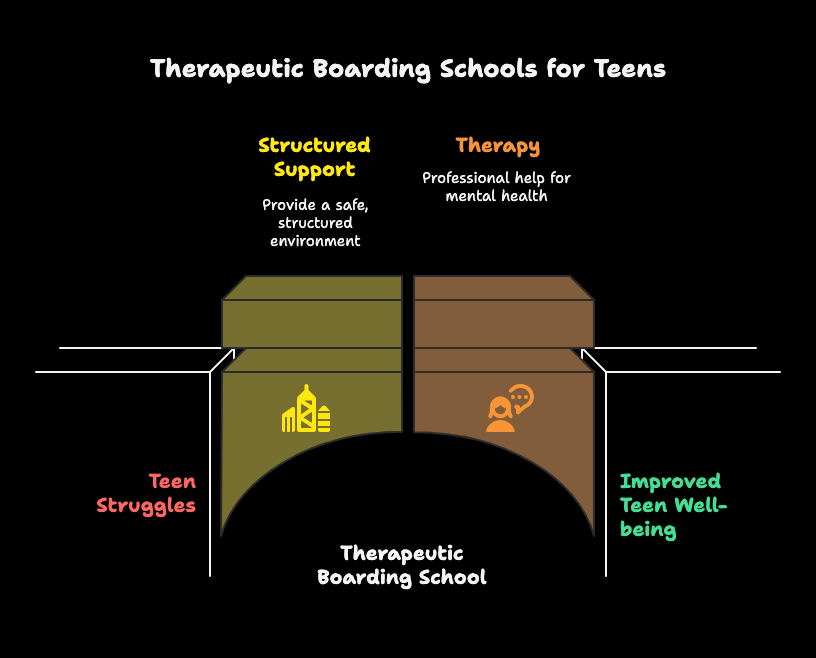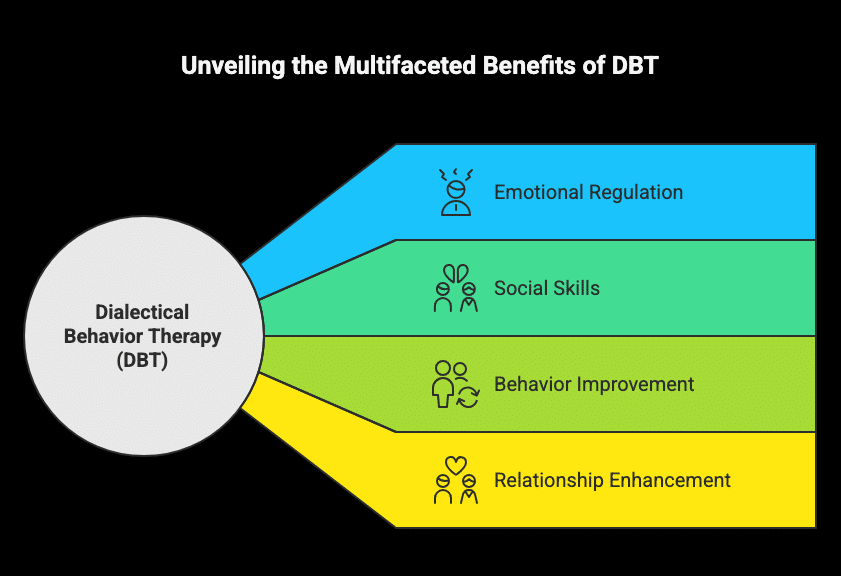Top Therapeutic Boarding School for Troubled Teens:
A Path to Healing
We Help You:
- Find the right boarding school
- Work out our financing options
- Educate you on the laws
- Our services are 100% free
Free Consultation
Fill out the form for a free and confidential consultation
"*" indicates required fields
Free Consultation
Fill out the form for a free and confidential consultation
"*" indicates required fields
Are you struggling to find the right environment to support your troubled teen? At Help Your Teen Now, we take the burden off parents by helping you find the therapeutic boarding school best suited for your teenage son or daughter. We also assist you in navigating financing options, making this challenging process easier. Our call and services are 100% free, and our experienced advocates are here to answer your questions and guide you toward the best solutions.
A therapeutic boarding school for troubled teens might be the solution you need. These specialized facilities provide a structured setting where teens can receive intensive therapy alongside their education. This article will guide you through what therapeutic boarding schools offer, when to consider them, and how they can transform lives. With Help Your Teen Now supporting you every step of the way.
Key Takeaways
- Therapeutic boarding schools provide a unique blend of education and therapy, designed to support troubled teens while addressing their emotional and academic needs in a supportive, structured environment.
- Early intervention is crucial, as these schools help teens facing serious challenges like substance abuse and emotional turmoil, offering a pathway to recovery and personal growth.
- Customized treatment plans, combined with family support and holistic care, enable lasting positive transformations in students, fostering healthier relationships and improved family dynamics.
- Help Your Teen Now offers free guidance to parents, helping you navigate program options, laws, regulations, and financing to find the best fit for your teen.
Understanding Therapeutic Boarding Schools

Therapeutic boarding schools are primarily educational institutions where students are housed full-time and receive intensive and individualized therapy. Unlike traditional boarding schools, these institutions function as a type of residential therapeutic school, providing a comprehensive residential treatment model that combines education with therapeutic care.
What sets therapeutic boarding schools apart from traditional boarding schools is the presence of licensed therapists and mental health professionals on staff. These professionals offer around-the-clock support, ensuring that young people receive continuous therapeutic and educational guidance.
Therapeutic boarding schools prioritize:
- Emotional and social development often offers extensive clinical support.
Creating a nurturing atmosphere that facilitates both healing and academic achievement. - Limiting unsupervised access to technology to help students focus on personal growth and therapy, free from external distractions and negative influences.
How Help Your Teen Now Can Help
If you’re feeling overwhelmed by the choices and regulations involved in selecting a therapeutic boarding school, Help Your Teen Now is here to guide you. Our advocates can help you understand the laws, specialties, program durations, and financing options, narrowing your selection so you can focus on the best choices for your teen and your family.
Choose You Preferred Location

When to Consider a Therapeutic Boarding School for Your Teen
Parents might consider therapeutic boarding schools for their teens when negative behaviors interfere with their success in traditional schools and other environments. These behaviors can include:
- Substance abuse
- Excessive truancy
- Severe emotional challenges
- Facing behavioral and emotional challenges
- Family challenges
For some families, the decision to enroll their child in a therapeutic boarding school becomes necessary when other interventions have failed to produce lasting change.

Types of Therapeutic Boarding Schools

Therapeutic boarding schools come in a variety of forms, each designed to meet the unique needs of troubled teens facing behavioral and emotional challenges. Some schools, such as Christian therapeutic boarding schools, integrate faith-based mentoring and spiritual development into their daily routines, helping students grow both emotionally and spiritually.
Other therapeutic boarding schools focus on addressing specific behavioral and emotional challenges, offering specialized therapeutic support and licensed counseling tailored to each student’s needs. These schools may utilize evidence-based therapies such as dialectical behavior therapy (DBT) to help students manage intense emotions and develop healthier coping strategies.
Remember, Help Your Teen Now encourages parents to consider out-of-state boarding schools for troubled youth, even if they initially seem intimidating. Our team’s collective experience will guide you through the entire process and help determine the best location and program for your son or daughter.
What Issues Do Therapeutic Boarding Schools Address?
Therapeutic boarding schools for troubled youth can help address a wide range of issues, including severe ADHD, anxiety, depression, eating disorders, violent behaviors, and substance abuse. Without intervention, troubled teens may face increased substance abuse, risky sexual activity, self-harm, aggression, criminal activity, and even suicide. The structured environment and therapeutic support provided by these schools can make a significant difference in the lives of these teens.
Early Intervention Is So Important
Potential consequences of not addressing a troubled teen’s issues are severe. These include:
- Worsening depression
- Suicidal thoughts
- Increased aggressive behavior
- Violent outbursts
- Juvenile delinquency
- Increased addiction
- Dropping out of school
Early intervention is vital, as many studies have documented the need for it in troubled children and teens to prevent worsening conditions.
A lack of accountability for their actions from teen girls and boys can lead to persistent conflict at home and suggests the necessity for structured support. Parents should consider this option if they fear their son or daughter might harm herself or others, is severely depressed or out of control, or if substance abuse threatens their well-being.
Key Benefits of Therapeutic Boarding Schools

Therapeutic boarding schools offer several key benefits that make them an attractive option for families seeking help for their troubled teens:
- A secure environment that prioritizes safety protocols and promotes a positive emotional culture, creating a space where students can focus on recovery and personal growth.
- The presence of qualified staff.
- Customized treatment plans that ensure each student’s unique needs are met, providing comprehensive care.
Another important benefit is the ability of therapeutic boarding schools to unify families. Providing tools and strategies for better communication and relationship-building helps families reconnect and strengthen their bonds.
Integrated Educational Programs
Therapeutic boarding schools provide a unique combination of education and therapy, enabling students to address emotional and behavioral issues while achieving academic success.
The academic programs in therapeutic boarding schools are usually tailored to be self-paced, with one-on-one instruction. These personalized learning experiences integrate therapeutic practices within the academic curriculum, fostering holistic development and ensuring that students receive the support they need to succeed.
Safe Environment
Therapeutic boarding schools provide a structured and supervised environment, removing students from negative influences and ensuring they are in a secure and supportive setting conducive to their progress. Key components of this supportive environment include:
- Constant supervision
- A secure physical space
- Policies in place to prevent bullying
- Measures to ensure student safety
This structured environment allows students to focus on their healing without external distractions or safety concerns, promoting emotional regulation and healthier relationships. Providing a safe and nurturing atmosphere, therapeutic boarding schools create an optimal environment for personal growth and recovery.
Comprehensive Care
These institutions offer around-the-clock support, emphasizing healing in a structured environment. Students at therapeutic boarding schools benefit from continuous supervision and a range of therapeutic services aimed at fostering personal growth and addressing mental health needs. This comprehensive approach ensures that students receive the care they need to develop better coping mechanisms and improve their behavioral patterns.
Conditions Treated at Therapeutic Boarding Schools
Therapeutic boarding schools are equipped to help troubled teens overcome a wide spectrum of behavioral and emotional challenges.
These schools provide a supportive environment where students can address conditions such as:
- ADHD
- Anxiety
- Depression
- Oppositional defiant disorder
The goal is to help teens heal, develop healthier coping mechanisms, and restore balance within the family. With the guidance of experienced professionals, students learn to manage their behavioral issues and emotional struggles, empowering them to thrive both at school and at home.
Types of Therapy Offered at Therapeutic Boarding Schools
Therapeutic boarding schools offer a wide range of therapies designed to meet the specific mental health needs of each student. These include:
- Individual sessions
- Group therapy
- Family therapy
- Specialized approaches such as Dialectical Behavior Therapy (DBT) and Trauma-Focused Cognitive Behavioral Therapy (TF-CBT)
This personalized support approach ensures that each student receives high-quality care through individual counseling to address unique behavioral challenges.
What is Dialectical Behavior Therapy (DBT)?
Dialectical Behavior Therapy (DBT) is a key component of many therapeutic programs in these schools, helping students manage intense emotions and improve their social skills and interpersonal relationships. DBT is particularly effective for teens struggling with emotional regulation and can lead to significant improvements in their behavior and relationships.
What is Trauma-Focused Cognitive Behavioral Therapy (TF-CBT)?
Trauma-Focused Cognitive Behavioral Therapy (TF-CBT) is also utilized to help teens address and heal from past trauma. This specialized therapy is designed to help students process their traumatic experiences and develop healthier coping mechanisms. The combination of these various therapeutic approaches ensures that students receive comprehensive care tailored to their specific needs.

Alternative Therapies
Common alternative therapies include equine therapy, where working with horses helps teens build trust and confidence; art therapy, which encourages self-expression and emotional release; and music therapy, which uses rhythm and melody to support emotional healing.
By incorporating these diverse therapies, therapeutic boarding schools help students achieve academic success, develop stronger social skills, and experience meaningful personal growth.
Character Development
Character development is at the heart of the mission for many therapeutic boarding schools. These schools believe that fostering strong values and positive character traits is essential for long-term success and personal fulfillment. Through structured programs, students are taught the importance of integrity, responsibility, respect, and empathy.
How Therapeutic Boarding Schools Support Family Relationships
Enrolling a troubled teen in a therapeutic boarding school can relieve the strain on family dynamics, allowing relationships to improve as the family steps back from daily behavioral challenges.
Family therapy sessions are often integrated into family visits, promoting open communication and establishing a positive atmosphere for reunions. These sessions help strengthen communication and redefine family roles, ensuring that all family members and the whole family are involved in the healing process of family restoration.
Choosing the Right Therapeutic Boarding School
Selecting the right therapeutic boarding school is a critical decision that requires careful research and consideration. Parents should spend time comparing different schools to find the best fit for their child’s specific needs.
Ultimately, the chosen school must serve the child’s long-term best interests. This means ensuring that the school’s therapeutic and academic programs align with the child’s needs and goals. A thorough evaluation of the school’s staff qualifications, therapeutic approaches, and success rates can provide parents with the confidence to make an informed decision.
Help Your Teen Now is here to simplify this process for you. Our knowledgeable advocates can help you understand program differences, regulations, and financing, ensuring you make the best decision for your teen’s future.

The Importance of Accreditation
When families are seeking a therapeutic boarding school for their troubled teen, accreditation should be a top priority. Accreditation is a mark of quality that assures families the school meets rigorous standards for education, therapeutic care, and student safety. Accredited therapeutic boarding schools are regularly reviewed to ensure they provide a supportive environment, employ qualified staff, and maintain high-quality care in both their academic and therapeutic programs.
For families, this means peace of mind knowing their child is in a safe, nurturing environment that prioritizes both personal growth and academic achievement. By selecting an accredited therapeutic boarding school, families can trust that their investment in their child’s future will yield meaningful, lasting results.
Payment Options and Financial Assistance
The cost of therapeutic boarding schools can be a significant concern for many families, with expenses typically starting at $2,500 per month. Factors such as location and the level of care provided can influence these costs. Some health insurance plans may offer limited coverage for mental health services related to therapeutic boarding schools.
Flexible Spending Accounts (FSAs) or Health Savings Accounts (HSAs) can help cover some of the expenses, making a therapeutic boarding school experience more affordable. Additionally, scholarships and grants based on financial need or specific circumstances can significantly reduce the financial burden.
Options for covering tuition costs include:
- Educational loans offered by various financial institutions are specifically designed for educational purposes.
- Crowdfunding platforms that allow friends and family to contribute towards the cost of a therapeutic boarding school.
- Government programs that may offer additional financial assistance or scholarships, though eligibility varies by state.
At Help Your Teen Now, we help parents explore all available payment options to find solutions that fit your family’s budget.
A Day in the Life at a Therapeutic Boarding School
A typical day at a therapeutic boarding school begins early, with students engaging in morning routines that include chores and personal hygiene. These routines set a positive tone for the day and help students develop a sense of responsibility. Breakfast is an important meal, with healthy options provided to ensure students start their day on the right foot.
Academic classes are structured to provide a balance of academic support and challenge, focusing on student achievement and personal growth. After a nutritious lunch, students participate in physical education sessions led by trained coaches, promoting physical health and well-being.
In the afternoon, students engage in experiential therapies, such as art and equine therapy, which help them express and process their emotions. Adventure therapy is another unique option, involving outdoor activities that foster personal growth and teamwork.
Evening activities are often planned by students, allowing them to practice group decision-making and budgeting life skills training. The day concludes with a set lights-out time, ensuring students have adequate rest to support their overall well-being.
Summary
Therapeutic boarding schools offer a unique and comprehensive approach to helping troubled teens overcome their challenges and achieve personal growth. By providing a secure environment, integrated educational programs, and a wide range of therapeutic services, these schools address both the academic and emotional needs of their students.
For families struggling with troubled teens, therapeutic boarding schools can provide a path to healing and a brighter future. By carefully researching and selecting the right school, parents can ensure that their child receives the support they need to thrive.
Remember, you don’t have to face this journey alone. Help Your Teen Now is here to support you with free guidance, advocacy, and connection to the best therapeutic boarding schools and financing options.
Frequently Asked Questions
-
Why might parents consider boarding schools for their teens?
Parents often choose boarding schools for their teens to help address negative behaviors in a supportive, structured environment that promotes personal growth and healing. This positive change can set them on the path to success.
-
What are therapeutic boarding schools primarily designed for?
Therapeutic boarding schools are primarily designed to provide students with a structured environment that combines education with intensive, individualized therapy. This approach helps them heal and grow academically and emotionally.
-
What issues might lead parents to enroll their sons and daughters in therapeutic boarding schools?
Parents often enroll their teen sons and daughters in therapeutic boarding schools to address challenges like substance abuse, behavioral issues, or mental health disorders. It's a proactive step toward helping their children find the support and guidance they need to thrive.
-
What is the importance of early intervention for troubled teens?
Early intervention is crucial for troubled teens because it helps prevent their issues from escalating, allowing them to receive the support they need to thrive. Taking action early can lead to positive changes and brighter futures for these young individuals.
-
What are some potential consequences of not addressing a troubled teen's issues?
Ignoring a troubled teen's issues can lead to serious consequences like worsening mental health, increased aggression, and even dropping out of school. Addressing their challenges early on can make a world of difference in their future!
Request Free Admissions Information
"*" indicates required fields
